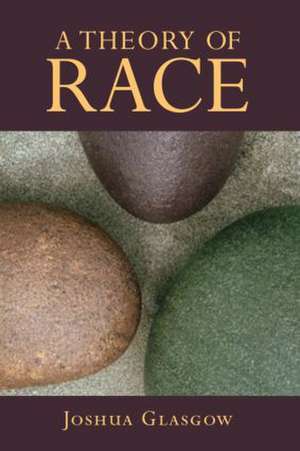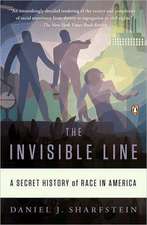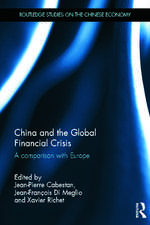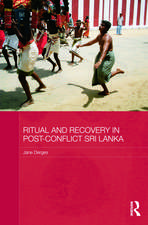A Theory of Race
Autor Joshua Glasgowen Limba Engleză Paperback – 4 dec 2008
Using both traditional philosophical tools and recent psychological research to investigate folk understandings of race, Glasgow argues that, as ordinarily conceived, race is an illusion. However, our pressing need to speak to and make sense of social life requires that we employ something like racial discourse. These competing pressures, Glasgow maintains, ultimately require us to stop conceptualizing race as something biological, and instead understand it as an entirely social phenomenon.
| Toate formatele și edițiile | Preț | Express |
|---|---|---|
| Paperback (1) | 381.98 lei 6-8 săpt. | |
| Taylor & Francis – 4 dec 2008 | 381.98 lei 6-8 săpt. | |
| Hardback (1) | 818.71 lei 6-8 săpt. | |
| Taylor & Francis – 4 dec 2008 | 818.71 lei 6-8 săpt. |
Preț: 381.98 lei
Nou
Puncte Express: 573
Preț estimativ în valută:
73.09€ • 76.32$ • 60.36£
73.09€ • 76.32$ • 60.36£
Carte tipărită la comandă
Livrare economică 15-29 aprilie
Preluare comenzi: 021 569.72.76
Specificații
ISBN-13: 9780415990738
ISBN-10: 0415990734
Pagini: 192
Ilustrații: 4 line drawings
Dimensiuni: 152 x 229 x 13 mm
Greutate: 0.27 kg
Ediția:New.
Editura: Taylor & Francis
Colecția Routledge
Locul publicării:Oxford, United Kingdom
ISBN-10: 0415990734
Pagini: 192
Ilustrații: 4 line drawings
Dimensiuni: 152 x 229 x 13 mm
Greutate: 0.27 kg
Ediția:New.
Editura: Taylor & Francis
Colecția Routledge
Locul publicării:Oxford, United Kingdom
Public țintă
General, Postgraduate, and UndergraduateRecenzii
"Glasgow’s book is a lucid, measured, and extremely valuable contribution to current discourse about race. It will go into the canon of serious analysis of race which has to be consulted by careful scholars."
- Naomi Zack, University of Oregon
"Joshua Glasgow’s blend of argumentation, analysis, and experimental philosophy is deeply engaging and thought-provoking. His arguments about the conservation of race, its reality, the meaning of ordinary racial terms, and the folk conception of race will be a reference point for debates within the philosophy of race for years to come."
- Ronald Sundstrom, University of San Francisco
"Glasgow has written a very readable and useful book on race theory. . . . In each section he gives definitions and explanations that are helpful and insightful. This is an important book for introducing the concepts, theories, and methodologies involved in race discussions."
- L.L. Lovern, Valdosta State University, CHOICE, Vol. 46, No. 11, August 2009
"Glasgow’s book is a lucid, measured, and extremely valuable contribution to current discourse about race. It will go into the canon of serious analysis of race which has to be consulted by careful scholars."
-Naomi Zack, University of Oregon
"Joshua Glasgow’s blend of argumentation, analysis, and experimental philosophy is deeply engaging and thought-provoking. His arguments about the conservation of race, its reality, the meaning of ordinary racial terms, and the folk conception of race will be a reference point for debates within the philosophy of race for years to come."
-Ronald Sundstrom, University of San Francisco
"Glasgow has written a very readable and useful book on race theory. This is an important book for introducing the concepts, theories, and methodologies involved in race discussions. . . . Highly recommended."
-L. L. Lovern, Valdosta State University, CHOICE, August 2009
"There is much in Glasgow's discussion that deserves close attention for he engages recent work in philosophy of language, philosophy of science, and ethics at a high level. His arguments deserve careful consideration and discussion."
-Sally Haslanger, MIT
"Joshua Glasgow has written a wonderful book on race. Thoughtful, clear, and provocative, it advances the discussion in significant ways."
-Michael O. Hardimon, UC San Diego
"Joshua Glasgow's A Theory of Race is a knowledgeable, insightful and well written treatment of a sweeping range of topics concerning race and racial classification. It is, as a result, a book that everyone interested in race or in the metaphysics of a socially significant human category should read."
-Ron Mallon, University of Utah
- Naomi Zack, University of Oregon
"Joshua Glasgow’s blend of argumentation, analysis, and experimental philosophy is deeply engaging and thought-provoking. His arguments about the conservation of race, its reality, the meaning of ordinary racial terms, and the folk conception of race will be a reference point for debates within the philosophy of race for years to come."
- Ronald Sundstrom, University of San Francisco
"Glasgow has written a very readable and useful book on race theory. . . . In each section he gives definitions and explanations that are helpful and insightful. This is an important book for introducing the concepts, theories, and methodologies involved in race discussions."
- L.L. Lovern, Valdosta State University, CHOICE, Vol. 46, No. 11, August 2009
"Glasgow’s book is a lucid, measured, and extremely valuable contribution to current discourse about race. It will go into the canon of serious analysis of race which has to be consulted by careful scholars."
-Naomi Zack, University of Oregon
"Joshua Glasgow’s blend of argumentation, analysis, and experimental philosophy is deeply engaging and thought-provoking. His arguments about the conservation of race, its reality, the meaning of ordinary racial terms, and the folk conception of race will be a reference point for debates within the philosophy of race for years to come."
-Ronald Sundstrom, University of San Francisco
"Glasgow has written a very readable and useful book on race theory. This is an important book for introducing the concepts, theories, and methodologies involved in race discussions. . . . Highly recommended."
-L. L. Lovern, Valdosta State University, CHOICE, August 2009
"There is much in Glasgow's discussion that deserves close attention for he engages recent work in philosophy of language, philosophy of science, and ethics at a high level. His arguments deserve careful consideration and discussion."
-Sally Haslanger, MIT
"Joshua Glasgow has written a wonderful book on race. Thoughtful, clear, and provocative, it advances the discussion in significant ways."
-Michael O. Hardimon, UC San Diego
"Joshua Glasgow's A Theory of Race is a knowledgeable, insightful and well written treatment of a sweeping range of topics concerning race and racial classification. It is, as a result, a book that everyone interested in race or in the metaphysics of a socially significant human category should read."
-Ron Mallon, University of Utah
Cuprins
Preface The Race Debate Dispatches from the Armchair: A Thinning Out the Concept of Race Methodology: How Should We Figure Out the Shape of Racial Discourse? The Contours of Racial Discourse Breaking Nature’s Bones Constructivism, Revisionism, and Anti-Realism Reconstructionism Afterword
Descriere
Social commentators have long asked whether racial categories should be conserved or eliminated from our practices, discourse, institutions, and perhaps even private thoughts. In A Theory of Race, Joshua Glasgow argues that this set of choices unnecessarily presents us with too few options.
Using both traditional philosophical tools and recent psychological research to investigate folk understandings of race, Glasgow argues that, as ordinarily conceived, race is an illusion. However, our pressing need to speak to and make sense of social life requires that we employ something like racial discourse. These competing pressures, Glasgow maintains, ultimately require us to stop conceptualizing race as something biological, and instead understand it as an entirely social phenomenon.
Using both traditional philosophical tools and recent psychological research to investigate folk understandings of race, Glasgow argues that, as ordinarily conceived, race is an illusion. However, our pressing need to speak to and make sense of social life requires that we employ something like racial discourse. These competing pressures, Glasgow maintains, ultimately require us to stop conceptualizing race as something biological, and instead understand it as an entirely social phenomenon.
















